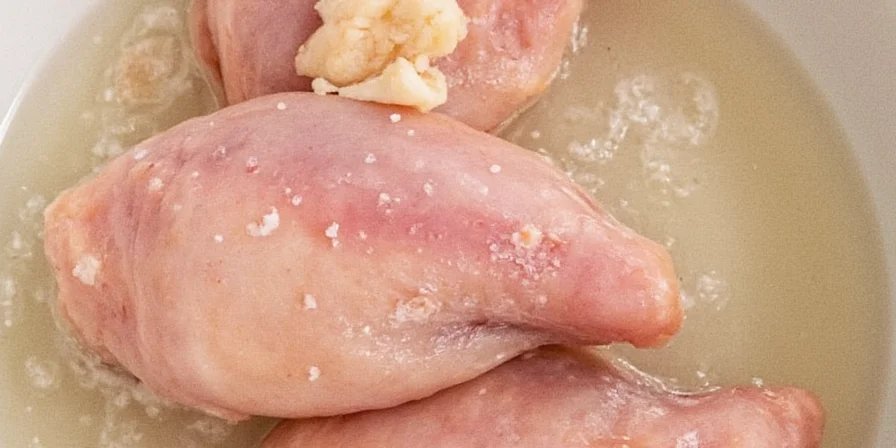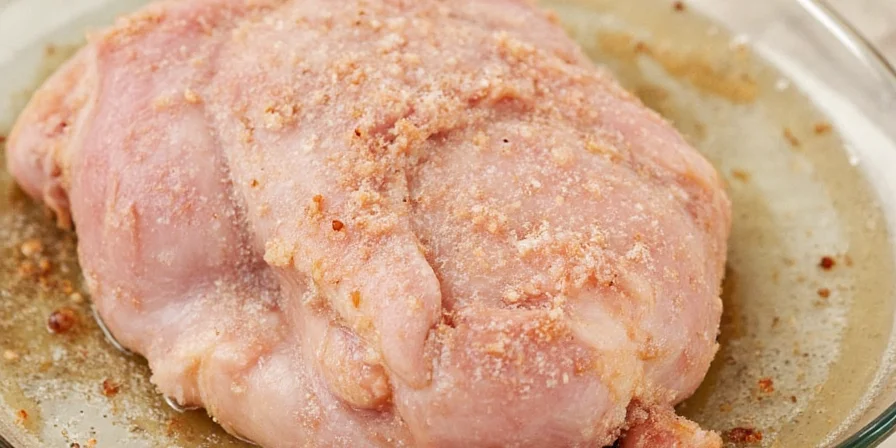The Secret Ingredient: Salt in Brining Chicken and How to Store It Like a Pro

Brining chicken is a game-changer for any home cook looking to elevate their culinary skills. But have you ever wondered why salt is the unsung hero behind this process? In this blog, we'll dive deep into the role of salt in brining and uncover some spice storage hacks that will keep your kitchen organized and your dishes delicious. Whether you're a seasoned chef or just starting out, this guide is your ticket to mastering brining and spice storage with ease.
Why Salt is the Star of the Show in Brining
Brining is the process of soaking meat in a saltwater solution before cooking. This technique helps to infuse the meat with moisture, enhance its flavor, and even improve its texture. But at the heart of this process lies one simple ingredient: salt. Yes, that's right—salt is the star of the show when it comes to brining chicken.
Salt works by drawing moisture into the meat through a process called osmosis. This not only helps the meat retain moisture during cooking, but also allows it to absorb flavors from any additional spices or herbs you might add to the brine. So, while salt is the primary ingredient, it's the foundation upon which all other flavors are built.
How Salt Affects the Brining Process
- Moisture Retention: Salt helps the chicken retain moisture, resulting in juicier and more tender meat.
- Flavor Enhancement: Salt enhances the natural flavors of the chicken and allows other spices to be more pronounced.
- Tenderization: Salt can help break down proteins in the chicken, making it more tender.
Understanding the Science Behind Salt in Brining
Now that we know salt is essential, let's break down the science behind brining. Salt is a solute, and when dissolved in water, it creates a hypertonic solution. This means that the concentration of salt outside the meat is higher than inside, causing water to move into the meat through osmosis. This process not only adds moisture but also allows the salt to penetrate the meat, enhancing its flavor and texture.
The ideal brine for chicken is usually a solution of about 3% salt by weight. This means that for every 100 grams of water, you should use 3 grams of salt. This ratio ensures that the chicken is properly brined without becoming too salty or dry.
Brining Time and Salt Concentration
The amount of time you brine your chicken depends on the size of the chicken pieces and the salt concentration of the brine. Here's a quick reference table to help you determine the right brining time:
| Chicken Cut | Salt Concentration (3%) | Recommended Brining Time |
|---|---|---|
| Chicken Breasts | 3% salt | 30 minutes to 1 hour |
| Chicken Thighs | 3% salt | 1 to 2 hours |
| Whole Chicken | 3% salt | 4 to 6 hours |
As you can see, larger cuts of chicken require longer brining times to ensure the salt and moisture penetrate properly. However, it's important to note that brining for too long can result in overly salty meat, so it's always a good idea to stick to the recommended times.
Spice Storage Hacks for the Busy Chef
Now that we've covered the basics of brining, let's shift our focus to something just as important: spice storage. Whether you're a fan of using fresh herbs or prefer to keep your spices on hand for easy access, proper storage is key to keeping your spices fresh and flavorful.
Tips for Storing Spices Properly
- Keep Spices in a Cool, Dark Place: Heat and light can cause spices to lose their potency over time. Store your spices in a cool, dark place like a pantry or spice cabinet.
- Use Airtight Containers: Air is the enemy of spices. Make sure your spices are stored in airtight containers to prevent moisture and air from getting in.
- Avoid Moisture: Moisture can cause spices to clump and lose their flavor. Store spices in a dry environment and avoid placing them near the stove or in areas with high humidity.
- Label Your Containers: It's easy to forget what spices you have and when they were last used. Label your containers with the name of the spice and the date it was opened.
- Use Fresh Spices: Spices lose their potency over time. Use them within 6 months to a year for the best flavor.
Common Spice Storage Mistakes to Avoid
Even the most experienced chefs can make mistakes when it comes to spice storage. Here are some common mistakes to avoid:
- Storing Spices in the Refrigerator: While it might seem like a good idea to keep spices in the fridge, the moisture and temperature fluctuations can cause them to lose flavor and aroma.
- Leaving Spices in Their Original Packaging: The original packaging is not designed for long-term storage. Transfer your spices to airtight containers for better protection.
- Storing Spices Near the Stove: The heat from the stove can cause spices to lose their potency. Keep them in a cool, dry place away from direct heat sources.
How to Use Spices Like a Pro
Proper storage is just the first step. Now that your spices are safely stored, it's time to learn how to use them like a pro. Here are a few tips to help you get the most out of your spices:
Using Spices in Brining
While salt is the primary ingredient in brining, adding spices can take your chicken to the next level. Here are a few common spices that work well in brining:
- Garlic: Adds a rich, savory flavor to the brine.
- Bay Leaves: Adds a subtle, aromatic flavor that enhances the overall taste of the chicken.
- Black Pepper: Adds a slight heat and depth of flavor to the brine.
- Thyme: Adds a fresh, herbal note that complements the saltiness of the brine.
- Rosemary: Adds a bold, piney flavor that works well with chicken.
When using spices in your brine, it's important to balance the flavors. Too much of any one spice can overpower the chicken, so it's best to start with small amounts and adjust to taste.
Brining Chicken: A Step-by-Step Guide
Now that we've covered the science behind brining and the role of salt, let's walk through the process of brining chicken step by step:
Ingredients
- 1 cup of salt
- 4 cups of water
- Optional: Garlic, bay leaves, black pepper, thyme, rosemary
Instructions
- Prepare the Brine: In a large bowl or container, mix the salt and water until the salt is fully dissolved.
- Add Spices (Optional): If you're using any additional spices, add them to the brine and mix well.
- Submerge the Chicken: Place the chicken in the brine, making sure it's fully submerged. If needed, you can add more water to cover the chicken.
- Brine the Chicken: Let the chicken brine for the recommended amount of time based on the size of the chicken pieces.
- Rinse and Cook: After brining, rinse the chicken thoroughly under cold water to remove any excess salt and spices. Then, cook the chicken as desired.
Brining chicken is a simple process that can yield incredible results. With the right brine and proper storage of your spices, you'll be able to create restaurant-quality dishes right in your own kitchen.
Conclusion: Brine Smart, Store Smart
Brining chicken is a powerful technique that can transform your cooking. But the success of your brine depends on the quality of your ingredients and the proper storage of your spices. Salt is the unsung hero of brining, but it's the spices that can take your dish from good to great.
Whether you're brining chicken for a weeknight meal or a special occasion, remember to store your spices properly and use them with care. With these spice storage hacks and brining tips, you'll be well on your way to becoming a master in the kitchen.
So go ahead, brine like a pro, and store your spices like a chef. Your taste buds—and your dinner guests—will thank you!

FAQ: Common Questions About Brining and Spice Storage
Can I reuse brine?
It's generally not recommended to reuse brine, as it can become contaminated and lose its effectiveness. Always use a fresh brine for each batch of chicken.
How long can I store spices?
Most spices can be stored for up to 6 months to a year if kept in a cool, dark place and in airtight containers. However, their potency will decrease over time.
Can I freeze brine?
Yes, you can freeze brine for future use. Just make sure to store it in airtight containers and label it with the date it was made.
What spices go well with chicken?
Common spices that work well with chicken include garlic, bay leaves, black pepper, thyme, rosemary, paprika, and cumin. Experiment with different combinations to find your favorite.
Can I brine chicken for too long?
Yes, brining chicken for too long can result in overly salty meat. It's best to stick to the recommended brining times for the best results.
With these tips and tricks, you're now equipped to brine like a pro and store your spices like a chef. So go ahead, get creative in the kitchen, and enjoy the delicious results!

Happy cooking!










 浙公网安备
33010002000092号
浙公网安备
33010002000092号 浙B2-20120091-4
浙B2-20120091-4